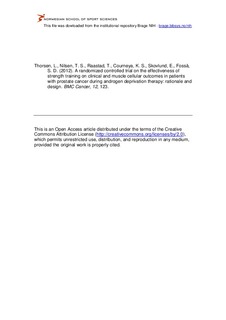| dc.contributor.author | Thorsen, Lene | |
| dc.contributor.author | Nilsen, Tormod S. | |
| dc.contributor.author | Raastad, Truls | |
| dc.contributor.author | Courneya, Kerry S. | |
| dc.contributor.author | Skovlund, Eva | |
| dc.contributor.author | Fosså, Sophie Dorothea | |
| dc.date.accessioned | 2012-10-15T07:44:26Z | |
| dc.date.available | 2012-10-15T07:44:26Z | |
| dc.date.issued | 2012-03-29 | |
| dc.identifier | Seksjon for fysisk prestasjonsevne / Department of physical performance | |
| dc.identifier.citation | BMC Cancer. 2012, 12, 123 | no_NO |
| dc.identifier.issn | 1471-2407 | |
| dc.identifier.uri | http://hdl.handle.net/11250/171012 | |
| dc.description | © 2012 Thorsen et al; licensee BioMed Central Ltd. | no_NO |
| dc.description.abstract | Background
Studies indicate that strength training has beneficial effects on clinical health outcomes in prostate cancer patients during androgen deprivation therapy. However, randomized controlled trials are needed to scientifically determine the effectiveness of strength training on the muscle cell level. Furthermore, close examination of the feasibility of a high-load strength training program is warranted. The Physical Exercise and Prostate Cancer (PEPC) trial is designed to determine the effectiveness of strength training on clinical and muscle cellular outcomes in non-metastatic prostate cancer patients after high-dose radiotherapy and during ongoing androgen deprivation therapy.
Methods/design
Patients receiving androgen deprivation therapy for 9-36 months combined with external high-dose radiotherapy for locally advanced prostate cancer are randomized to an exercise intervention group that receives a 16 week high-load strength training program or a control group that is encouraged to maintain their habitual activity level. In both arms, androgen deprivation therapy is continued until the end of the intervention period.
Clinical outcomes are body composition (lean body mass, bone mineral density and fat mass) measured by Dual-energy X-ray Absorptiometry, serological outcomes, physical functioning (muscle strength and cardio-respiratory fitness) assessed with physical tests and psycho-social functioning (mental health, fatigue and health-related quality of life) assessed by questionnaires. Muscle cellular outcomes are a) muscle fiber size b) regulators of muscle fiber size (number of myonuclei per muscle fiber, number of satellite cells per muscle fiber, number of satellite cells and myonuclei positive for androgen receptors and proteins involved in muscle protein degradation and muscle hypertrophy) and c) regulators of muscle fiber function such as proteins involved in cellular stress and mitochondrial function. Muscle cellular outcomes are measured on muscle cross sections and muscle homogenate from muscle biopsies obtained from muscle vastus lateralis.
Discussion
The findings from the PEPC trial will provide new knowledge on the effects of high-load strength training on clinical and muscle cellular outcomes in prostate cancer patients during androgen deprivation therapy. | no_NO |
| dc.language.iso | eng | no_NO |
| dc.publisher | BioMed Central | no_NO |
| dc.subject | strength training | no_NO |
| dc.subject | prostate cancer | no_NO |
| dc.subject | androgen deprivation therapy | no_NO |
| dc.subject | clinical and muscle cellular outcomes | no_NO |
| dc.title | A randomized controlled trial on the effectiveness of strength training on clinical and muscle cellular outcomes in patients with prostate cancer during androgen deprivation therapy: rationale and design | no_NO |
| dc.type | Journal article | no_NO |
| dc.type | Peer reviewed | no_NO |
| dc.subject.nsi | VDP::Mathematics and natural science: 400::Basic biosciences: 470 | no_NO |
| dc.subject.nsi | VDP::Medical disciplines: 700::Clinical medical disciplines: 750 | no_NO |
| dc.subject.nsi | VDP::Medical disciplines: 700::Health sciences: 800 | no_NO |
| dc.source.pagenumber | 123 | no_NO |
| dc.source.volume | 12 | no_NO |
| dc.source.journal | BMC Cancer | no_NO |
